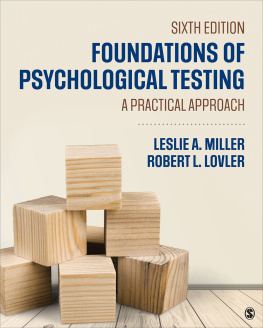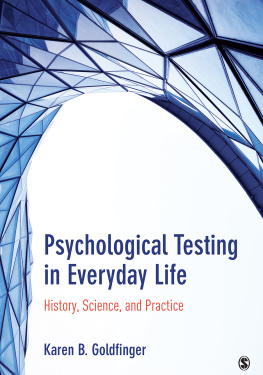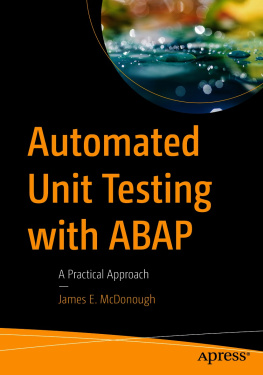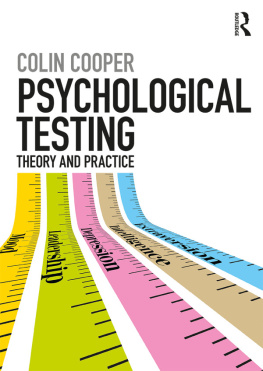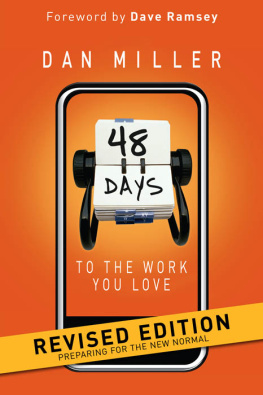Leslie A. Miller - Foundations of Psychological Testing: A Practical Approach
Here you can read online Leslie A. Miller - Foundations of Psychological Testing: A Practical Approach full text of the book (entire story) in english for free. Download pdf and epub, get meaning, cover and reviews about this ebook. year: 2019, publisher: SAGE Publications, genre: Children. Description of the work, (preface) as well as reviews are available. Best literature library LitArk.com created for fans of good reading and offers a wide selection of genres:
Romance novel
Science fiction
Adventure
Detective
Science
History
Home and family
Prose
Art
Politics
Computer
Non-fiction
Religion
Business
Children
Humor
Choose a favorite category and find really read worthwhile books. Enjoy immersion in the world of imagination, feel the emotions of the characters or learn something new for yourself, make an fascinating discovery.
- Book:Foundations of Psychological Testing: A Practical Approach
- Author:
- Publisher:SAGE Publications
- Genre:
- Year:2019
- Rating:4 / 5
- Favourites:Add to favourites
- Your mark:
- 80
- 1
- 2
- 3
- 4
- 5
Foundations of Psychological Testing: A Practical Approach: summary, description and annotation
We offer to read an annotation, description, summary or preface (depends on what the author of the book "Foundations of Psychological Testing: A Practical Approach" wrote himself). If you haven't found the necessary information about the book — write in the comments, we will try to find it.
Foundations of Psychological Testing: A Practical Approach — read online for free the complete book (whole text) full work
Below is the text of the book, divided by pages. System saving the place of the last page read, allows you to conveniently read the book "Foundations of Psychological Testing: A Practical Approach" online for free, without having to search again every time where you left off. Put a bookmark, and you can go to the page where you finished reading at any time.
Font size:
Interval:
Bookmark:
Sixth Edition
Leslie Miller dedicates this book to her husband, Robert Miller, and children, Zachary Kenneth Miller and Kia Anne Miller.
Robert Lovler dedicates this book to his wife, Patsy Lovler, his daughter, Lauren Lovler, and his mentor at Hofstra University, Dr. William Metlay.
A Practical Approach
Sixth Edition
- Leslie A. Miller
- LanneM TM, LLC
- Robert L. Lovler
- Wilson Learning Corporation

- Los Angeles
- London
- New Delhi
- Singapore
- Washington DC
- Melbourne

FOR INFORMATION:
SAGE Publications, Inc.
2455 Teller Road
Thousand Oaks, California 91320
E-mail: order@sagepub.com
SAGE Publications Ltd.
1 Olivers Yard
55 City Road
London EC1Y 1SP
United Kingdom
SAGE Publications India Pvt. Ltd.
B 1/I 1 Mohan Cooperative Industrial Area
Mathura Road, New Delhi 110 044
India
SAGE Publications Asia-Pacific Pte. Ltd.
18 Cross Street #10-10/11/12
China Square Central
Singapore 048423
Copyright 2020 by SAGE Publications, Inc.
All rights reserved. Except as permitted by U.S. copyright law, no part of this work may be reproduced or distributed in any form or by any means, or stored in a database or retrieval system, without permission in writing from the publisher.
All third party trademarks referenced or depicted herein are included solely for the purpose of illustration and are the property of their respective owners. Reference to these trademarks in no way indicates any relationship with, or endorsement by, the trademark owner.
Printed in the United States of America
ISBN: 978-1-5063-9640-8
This book is printed on acid-free paper.

Acquisitions Editor: Abbie Rickard
Content Development Editor: Emma Newsom
Editorial Assistant: Elizabeth Cruz
Production Editor: Jane Martinez
Copy Editor: Renee Willers
Typesetter: C&M Digitals (P) Ltd.
Proofreader: Alison Syring
Indexer: May Hasso
Cover Designer: Scott Van Atta
Marketing Manager: Jenna Retana
Psychological testing is big business. Not only are the numbers of individuals and organizations using psychological tests continuing to increase, but also the magnitude and consequences of the decisions being made using tests are increasing. For example, educators are using test results not only to make decisions about students (determine who will receive high school diplomas, who will be admitted to college, who will participate in special school programs, and who will earn high and low grades), but also to make decisions about teachers and schools, such as teacher performance, teacher pay, and school funding. Clinicians are using tests to help diagnose psychological disorders and plan treatment programs. Industrial and organizational psychology consultants are using tests to select people for jobs, measure individual job performance, and evaluate the effectiveness of training programs. Students are using tests to gain greater insight into their personal interests, decide which college majors to pursue, and determine the graduate or professional schools to which they might apply. Professional organizations and governmental agencies are using licensing and certification tests to be sure that individuals engaged in certain occupations have the necessary qualifications to ensure that the safety of the public is protected.
In spite of widespread use, psychological tests continue to be misunderstood and used improperly. At one extreme, these misunderstandings and misuses have led many people to believe that psychological tests are useless or even extremely harmful. At the other extreme, many other people believe that psychological tests serve as ideal and extremely precise instruments of measurement. More commonly, these misunderstandings and misuses have led to the misconceptions that psychological testing is synonymous with diagnosing mental disorders, that psychological tests can and should be used as a sole means for making decisions, and that anyone can create, administer, or interpret a psychological test.
We originally wrote the first edition of Foundations of Psychological Testing in response to the growing need for a scholarly, yet pragmatic and easy-to-understand, introductory textbook for students new to the field of psychological testing and to the concepts of statistics and psychometrics that support its practice. As with the five previous editions of this textbook, we had two primary objectives in writing the sixth edition. Our first objective was to prepare students to be informed consumers of psychological testsas test users or test takersrather than to teach students to administer or interpret individual psychological tests. To meet our objective, in each edition we have focused the first two thirds of the textbook primarily on the basic concepts, issues, and tools used in psychological testing and their relevance to daily life. We have focused the last third of the book on how tests are used in educational, clinical/counseling, and organizational settings.
Our second objective for each edition has been to present information in a way that is maximally conducive to student learning. Over the years, many of our students have lamented that textbooks do not always explain material as clearly as a professor would during a class lecture. Students have also said that textbooks lack practical application of the material covered. We have designed this textbook, and each edition, with those students comments in mind. Not only does Foundations of Psychological Testing provide a fresh look at the field of psychological testing, but also we continue to write in a style that we believe will encourage and promote student learning and enthusiasm.
We focus on communicating the basics of psychological testing clearly and concisely, and we relate these basics to practical situations that students can recognize and understand. We also present information at a comfortable reading level and in a conversational format. Although current textbooks on psychological testing continue to move in this direction, we believe that some books are too complex and contain more detailed discussion of certain technical issues than is necessary for students first introduction to testing.
For the current edition, almost 19 years since the first edition was published, our primary objective was to again address the valuable feedback from our reviewers. At a global level, we made the following changes in the 6th edition:
- Added more detailed concept maps at the beginning of each section to graphically organize the relationship between concepts and ideas presented in each chapter within each section
- Integrated critical thinking questions at the end of each chapter, linked to the chapter learning objectives, to provide students more opportunity to engage in their own thinking
- Eliminated the computerized testing chapter, moving critical content to other chapters
Font size:
Interval:
Bookmark:
Similar books «Foundations of Psychological Testing: A Practical Approach»
Look at similar books to Foundations of Psychological Testing: A Practical Approach. We have selected literature similar in name and meaning in the hope of providing readers with more options to find new, interesting, not yet read works.
Discussion, reviews of the book Foundations of Psychological Testing: A Practical Approach and just readers' own opinions. Leave your comments, write what you think about the work, its meaning or the main characters. Specify what exactly you liked and what you didn't like, and why you think so.

